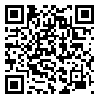Volume 5, Issue 4 (December 2023)
IEEPJ 2023, 5(4): 325-348 |
Back to browse issues page
Download citation:
BibTeX | RIS | EndNote | Medlars | ProCite | Reference Manager | RefWorks
Send citation to:



BibTeX | RIS | EndNote | Medlars | ProCite | Reference Manager | RefWorks
Send citation to:
Zahirinia M. (2023). Factors Influencing Resilience in the Elderly: A Systematic Review. IEEPJ. 5(4), 325-348. doi:10.22034/5.4.325
URL: http://ieepj.hormozgan.ac.ir/article-1-949-en.html
URL: http://ieepj.hormozgan.ac.ir/article-1-949-en.html
Associate Professor, Department of Social Sciences, University of Hormozgan, Bandar Abbas, Iran , zahirinia@hormozgan.ac.ir
Abstract: (1535 Views)
Objective: In contemporary society, the issue of aging and its investigation has gained significant importance due to the increasing elderly population. The myriad challenges faced by this demographic have brought the concept of resilience to the forefront. The growing body of literature in this area and the lack of comprehensive synthesis of studies underscore the necessity for a qualitative review method.
Methods: This research, conducted between October and November 2022, involved a thorough search of relevant articles on elderly resilience in Persian databases, including Magiran, Scientific Information Database, Noormags, and Iranian Research Institute for Information Science and Technology (IranDoc), as well as Google Scholar. The search utilized keywords such as resilience, elderly, aging, senior citizens, and the elderly. After screening based on inclusion and exclusion criteria, 31 relevant articles were selected for the article's composition.
Results: Through the examination of articles, identified themes were categorized into seven groups, including spirituality, mindfulness and acceptance, satisfaction, physical health promotion, mental health promotion, resilience education, and therapeutic education. The majority of articles focused on enhancing mental health resilience. Most studies were conducted in Tehran, with a concentration in the years 2021 and onwards. Overall, improving resilience in the elderly contributes to their life satisfaction and mental well-being. Therefore, interventions and resilience models need to be implemented to enhance the resilience of the elderly.
Conclusions: It is anticipated that forthcoming research on elderly resilience will encompass a diverse range of provinces, and the observed deficiency of qualitative studies on this topic necessitates investigations that explore the cultural, social, economic, and political dimensions of elderly resilience, in conjunction with individual and psychological factors.
Methods: This research, conducted between October and November 2022, involved a thorough search of relevant articles on elderly resilience in Persian databases, including Magiran, Scientific Information Database, Noormags, and Iranian Research Institute for Information Science and Technology (IranDoc), as well as Google Scholar. The search utilized keywords such as resilience, elderly, aging, senior citizens, and the elderly. After screening based on inclusion and exclusion criteria, 31 relevant articles were selected for the article's composition.
Results: Through the examination of articles, identified themes were categorized into seven groups, including spirituality, mindfulness and acceptance, satisfaction, physical health promotion, mental health promotion, resilience education, and therapeutic education. The majority of articles focused on enhancing mental health resilience. Most studies were conducted in Tehran, with a concentration in the years 2021 and onwards. Overall, improving resilience in the elderly contributes to their life satisfaction and mental well-being. Therefore, interventions and resilience models need to be implemented to enhance the resilience of the elderly.
Conclusions: It is anticipated that forthcoming research on elderly resilience will encompass a diverse range of provinces, and the observed deficiency of qualitative studies on this topic necessitates investigations that explore the cultural, social, economic, and political dimensions of elderly resilience, in conjunction with individual and psychological factors.
Type of Study: Original |
Subject:
Evolutionary Psychology
Received: 2023/01/15 | Accepted: 2023/09/11 | Published: 2023/12/1
Received: 2023/01/15 | Accepted: 2023/09/11 | Published: 2023/12/1
Send email to the article author
| Rights and permissions | |
 |
This work is licensed under a Creative Commons Attribution-NonCommercial 4.0 International License. |







